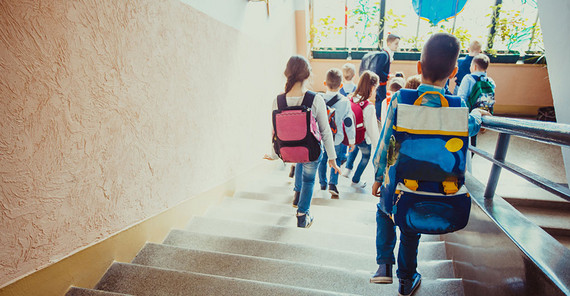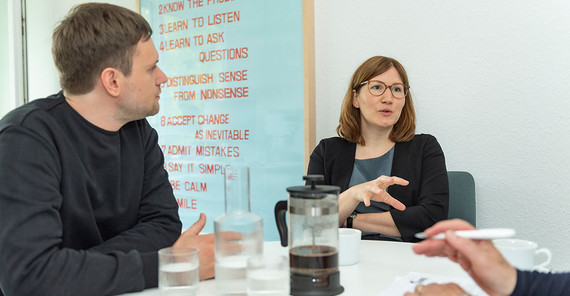As a professor of educational psychology at the University of Potsdam, Hanna Dumont has made it her profession to look at teaching and learning processes at school and at the question how instruction can accommodate children’s various learning needs. She examines how the composition of a class affects the development of the individual and what teachers can do to compensate for individual and social disadvantages.
Dumont does not see the growing heterogeneity in school classrooms as a problem but as a chance. “You just have to know how to use it,” the researcher says. There is no shortage of theories, methods, and concepts. But their implementation in school practice is more difficult than previously thought. In a current project, she therefore puts a special focus on transfer, which, as she says, has to be kept in mind in research on learning and instruction from the very beginning, just as during the development of new technologies for industry. In the initiative between the federal government and local states “Schule macht stark – SchuMaS” (“School Makes You Strong”), she is responsible for the subproject “Interconnection and Transfer”, together with her colleagues Karina Karst in Mannheim and Anne Sliwka in Heidelberg. The project, in which 200 schools and 13 research institutes in Germany are participating, is supposed to provide long-term support to schools in socially challenging circumstances. Over a period of ten years!
Learning from and with one another
Difficult conditions like an increased need for language support, high staff turnover, and parental homes at risk of poverty have contributed to students’ comparatively lower performance in the affected schools. In order to change this, the SchuMaS project intends to improve students’ basic competencies in reading and mathematics, increase their learning motivation and expand their social competencies. This means to further develop the curriculum, particularly in math and German, and systematically qualifying the teachers. The goal is to organize the entire school culture and the connection to the social environment — meaning the district or municipality — in such a way that learning continues beyond the classroom.
To ensure that individual schools are not overwhelmed, that they can talk about their experiences, and empower one another, all participants in the project work together in so-called school networks. “They should feel like they’re not alone and that other schools deal with very similar problems. Learning from and with one another can be more convincing than getting solutions prescribed by others,” Dumont says, who is asking for a change in thinking here, “a cultural transformation of our scientific approach.” Teachers often complain that they are constantly asked to try new things, she knows from many conversations. But that is not how it works. Transfer is not a one-way street but rather a dialogue between science and practice. “We want to use the expertise and experiences of the teachers and, together with them, work on developing measures that have a greater chance of being implemented.” She calls this co-constructive — a term from the glossary that her research assistant Simon Ohl has created for the website of the joint project. Being heard, she says, is how dialogue starts.
The central interest of the research project, she says, is to find out what the biggest local problems are and what needs to change so that schools in difficult circumstances can actually make children and teenagers “strong.” “Single measures often fizzle out when they miss the actual needs or are not understood,” Dumont knows. That is why she considers it important to also view everything through the eyes of the school staff and to ask whether the planned interventions make sense from their point of view.
Securing the initiated process of change in the long term
In the Germany-wide joint project, four regional centers were established which coordinate they research-practice-partnerships. For East German schools this is the DPIF | Leibniz Institute for Research and Information in Education in Berlin. Here they decide together with the schools, which concrete measures they want to implement. Five Brandenburg schools are also involved, in Schwedt, Prenzlau, Eberswalde, and Bernau. The idea is to support them in such a way that students can find their path in life despite challenging starting conditions as well as gain the knowledge and develop the skills with which they can noticeably improve their social situation.
To sustainably implement the necessary innovations in practice, Prof. Dumont aims to develop the appropriate structures and a common strategy in the research project. “All measures should work together in order to develop their full potential. It is so much more than the sum of its parts,” she is convinced. Coherence is therefore a guiding principle for the subproject “Interconnection and Transfer”. It is equally as important to set up capacities that will secure the initiated process of change at the schools in the long run. That not only means qualifying teachers and school management but also sustainably improving the processes and structures in the school and in cooperation with the education administration. Ultimately, the entire support system for students from socially challenging situations should change. Dumont and her colleagues from Mannheim and Heidelberg are therefore aiming for nothing less than a “theory of change”.
“This essentially goes far beyond classic education research. It involves a big dose of idealism,” the professor says, also in the direction of the research scientist working with her on the project. Simon Ohl sees it as a joint development project of science and practice and as a huge learning opportunity for himself. For his dissertation, which is almost finished, he looked at schools that have won the German School Award. What responses to the growing diversity in the classroom did they identify? And what was the relation between individual and collective learning? The analysis of best practices is helping him to kick off improvements together with the schools in challenging circumstances. He is sure that the academic appreciation of this work will increase the more an alternative understanding of transfer is able to prevail. “We do not know everything better,” he says with a view to his own profession. “We can only embark on the path to improvement together with school administrators and teachers, in every single school.”
The Project
Subproject “Interconnection and Transfer” in the research project ”Schule macht stark — SchuMaS” under the general coordination of the DPIF | Leibniz Institute for Research and Information in Education. The project comprises 13 research institutes, whose competencies and experiences are combined for school development.
Duration of the 1st funding phase: 2021-2025
Funded by the Federal Ministry of Education and Research (BMBF)
The Researchers
Prof. Hanna Dumont studied psychology in Trier and received her doctorate in Tübingen. After her habilitation at Freie Universität Berlin she became Professor of Educational Psychology with a focus on teaching and learning processes in schools at the University of Potsdam in 2021.
Mail: hanna.dumontuuni-potsdampde
Simon Ohl studied pedagogy and educational science in Gießen and Berlin. He is a research scientist at the research group for Educational Psychology with a focus on teaching and learning processes in schools at the University of Potsdam.
Mail: simon.ohluuni-potsdampde
This text was published in the university magazine Portal Wissen - Two 2022 „Humans“ (PDF).


